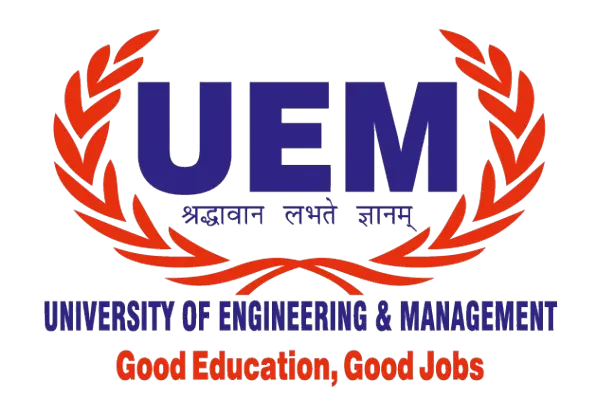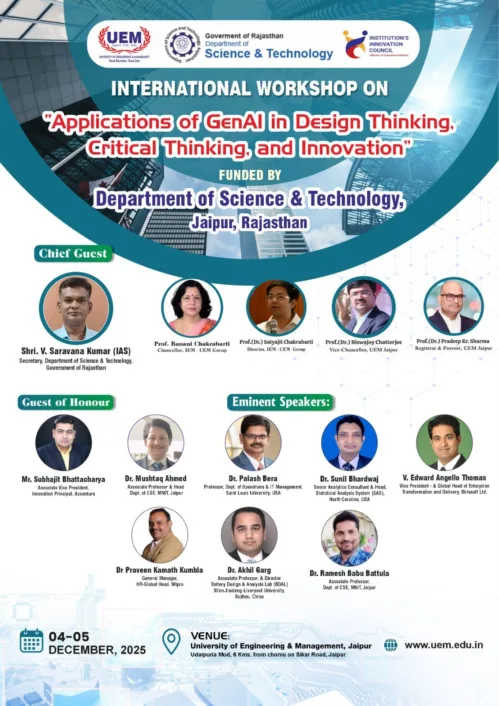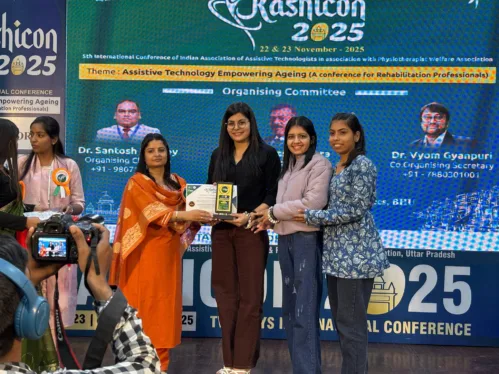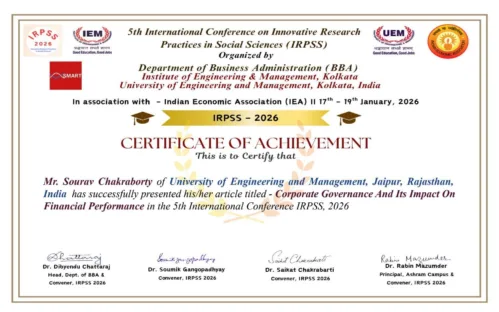University of Engineering & Management Jaipur
Department of Civil Engineering
Best BTech College in Jaipur, Rajasthan
Apply for AdmissionCourses are AICTE Approved

B.Tech (4 years) – Bachelor of Technology
Eligibility Criterion
- Passed class 12 board exams from recognized board
- Passed in IEMJEE exam/JEE Main/State level Engineering Entrance Exam
- Must have Physics and Mathematics as compulsory subjects in class 12 and Biology/Chemistry/Vocational subjects as another compulsory subject
- 45% marks in aggregate of these 3 compulsory subjects in class 12 board exams
- Individual pass marks in all these 3 subjects in class 12 board exams
- Good speaking skills to be judged during admission
- Shall not have year gap of more than 2 years throughout career till engineering admissions (Sitting idle for a year or being engaged in a course leading to no degree or certificate would mean year gap of 1 year)
Mode of Selection
IEMJEE
Specialization
- Sustainable Construction Engineering
Syllabus
Know more about what is taught in the entire curriculam in the link provided below:
Syllabus for CivilFaculty
View DetailsFees
View DetailsPublications
View DetailsPlacements
View DetailsAbout the department
The Department of Civil Engineering is a center where prominent civil
engineering research encounters the infrastructural necessities of the
society. Civil Engineering deals with the talent and knowledge of
construction dams, bridges, highways, water supply systems, modern
townships, waste management and pollution hindrance etc. Naturally,
civil engineers work in fields such as civil designing, township
planning, building inspecting, building material testing, construction
project officer, etc.
Civil engineers of today need in-depth
understanding of physics, mathematics, geology and hydrology. Apart from
an understanding of these basic concepts they need construction based
knowledge as well. With an amalgamation of such concepts and practices
engineers can design structures that meet requirements like cost,
safety, reliability, durability, and energy adeptness. The advances in
other fields become pragmatic to supplement civil engineering research
and practice.
Vision
- Our civil engineering program will uphold a resilient prominence and stress on undergraduate education with the objective that our program will be acknowledged for quality instruction in civil engineering analysis and design.
- A significant importance of the civil engineering program is preparation of students for professional engineering licensure and practice, and we believe that most of our students will follow this objective subsequent to graduation. The students study to correlate the civil engineering conceptions with the real-world situation.
- The vision of this department is to attain national identification through education and research in materials, advanced infrastructure systems; mechanics and computing; environmental engineering, science.
- Our department offers a cooperative and competitive atmosphere in which students learn to relate the theoretical aspects with the realistic problems. The civil engineering program intents to assist the nation by providing a quality engineering education that equips students to enter in professional life that can enhance the civil infrastructure, and financial benefits.
Mission
- The program offers holistic education in the subject including mathematics, physics, chemistry, engineering mechanics, and civil engineering, combined with application of modern engineering tools like state of the art design software.
- Graduates will achieve the abilities for entrance in civil engineering positions for furtherance towards professional engineering registration, and will have a firm undergraduate basis in general civil engineering principles, permitting sustained education at progressive levels.
- To create and integrate knowledge of science, engineering, and technology that expands the knowledge of civil, environmental engineering.
- The aim is to innovate and develop applications to improve civil engineering practice.
- The mission of the civil engineering program is to provide students with a broad and thorough education in civil engineering fundamentals, applications, and design that prepares them for the practice of civil engineering at the professional level with the confidence and skills necessary to meet the technical and social challenges of the future.
A glimpse into the department
Civil Engineering Program Educational Objectives
Guided by the Mission of the University, the Civil Engineering program is committed to preparing students who will be thoughtful, responsible, and successful citizens. Within three to five years of graduation, the program expects that Civil Engineering graduates will have:
- Developed their communication skills in oral, written, visual and graphic modes when working as team members or leaders, so they can actively participate in their communities and their profession.
- Established an understanding of professionalism, ethics, quality performance, public policy, safety, and sustainability that will allow them to be professional leaders and contributors to society when solving real time engineering problems and producing civil engineering solutions, keeping in mind both quality and economy.
- Become competent and engaged engineering professionals, applying their technical and managerial skills in the planning, design, construction, operation or maintenance of the built environment and global infrastructure, and utilizing their skills to analyze and design systems, specify project methods and materials, perform cost estimates and analyses, and manage technical activities in support of civil engineering projects.
- Initiated an active program of life-long learning, including studies leading to professional licensure or an advanced degree in engineering, that provides for continued development of their technical abilities and management skills, and attainment of professional expertise.
Civil Engineering Program Outcomes
Part I – Civil Engineering graduates will have:
- An understanding of professional and ethical responsibility.
- An ability to communicate effectively.
- The broad education necessary to understand the impact of engineering solutions in a global, economic, environmental, and societal context.
- A recognition of the need for, and an ability to engage in life-long learning.
- A knowledge of contemporary issues.
- An ability to use the techniques, skills, and modern engineering tools necessary for engineering practice.
- An ability to apply knowledge of mathematics, science, and engineering.
- An ability to design and conduct experiments, as well as to analyse and interpret data.
- An ability to design a system, component, or process to meet desired needs within realistic constraints such as economic, environmental, social, political, ethical, health and safety, manufacturability, and sustainability.
- An ability to function on multidisciplinary teams.
- An ability to identify, formulate, and solve engineering problems.
Part II – Civil Engineering graduates will have the additional ability to:
- Design a system, component, or process in more than one civil engineering context.
- Explain basic concepts in management, business, public policy, and leadership.
- Explain the importance of professional licensure.
- Apply knowledge of mathematics through differential equations, calculus-based physics, chemistry, and at least one additional area of science.
- Apply knowledge of four technical areas appropriate to civil engineering, including but not limited to structural, geotechnical, transportation, geomatics, environmental, and water resources engineering.
- Conduct civil engineering experiments and analyse and interpret the resulting data.















